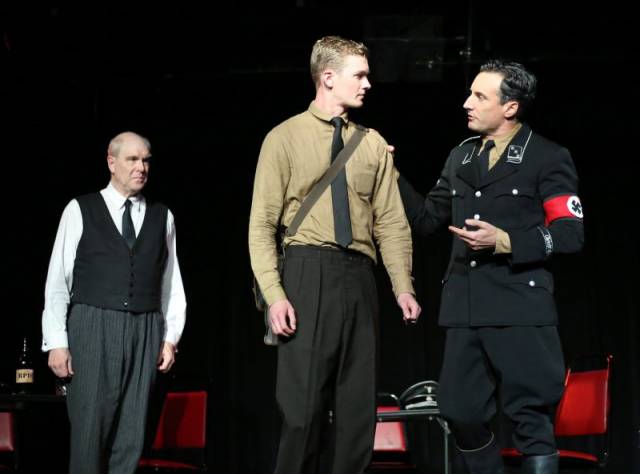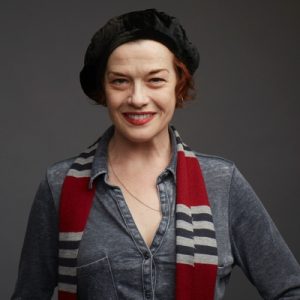
 This summer, FringeNYC audiences were treated to a new twist on a classic tale with The Radicalization of Rolfe, which takes on The Sound of Music from the perspective of the young messenger boy who vies for Liesl von Trapp's heart. The new play by Andrew Bergh explores both the lure and danger of the Nazis' rise, as Rolfe advances in his career while grappling with the 'deviant' feelings that could put his future at risk. At the helm of this bold new work is director Abigail Zealey Bess, a film and theatre director who also helps to support creators through her production company Weird Sisters. As The Radicalization of Rolfe returns to the stage this week as part of the Fringe Encores series, we spoke with Bess to learn more about taking on a beloved classic, the experience of bringing the show to the Fringe, and the beauty of theatre.
This summer, FringeNYC audiences were treated to a new twist on a classic tale with The Radicalization of Rolfe, which takes on The Sound of Music from the perspective of the young messenger boy who vies for Liesl von Trapp's heart. The new play by Andrew Bergh explores both the lure and danger of the Nazis' rise, as Rolfe advances in his career while grappling with the 'deviant' feelings that could put his future at risk. At the helm of this bold new work is director Abigail Zealey Bess, a film and theatre director who also helps to support creators through her production company Weird Sisters. As The Radicalization of Rolfe returns to the stage this week as part of the Fringe Encores series, we spoke with Bess to learn more about taking on a beloved classic, the experience of bringing the show to the Fringe, and the beauty of theatre.
What first attracted you to this play?
Immediately was the fact that it gave me the opportunity to work with Andy Bergh who wrote the play and Glenn Krutoff who produced it. The subject matter was obviously a big factor and the "radical" way in which it's handled. I loved the concept of taking the B Characters from The Sound of Music and using them to tell a story with such an unexpected twist.
The Radicalization of Rolfe follows the plot of The Sound of Music and references the original musical frequently, but also exists as its own piece. How important was the original musical in terms of how you approached the play? Were you trying to remain faithful to the original show, or use it as more of a general reference point before going your own way?
We stayed true to certain plot elements from the musical but clearly we had a very different story to tell -- I think much more important was using it as a reference to the story of what happened to those characters that stayed behind once Austria was taken over by Germany. It's a much less happy ending and more sinister than what The Sound of Music appears to be. That said, we could not have asked for better material to support the behind-the-scenes story and certainly Rolfe, Zeller, Franz and Schmidt (and of course Johan) were the inspiration for this play.
What do you think is the benefit of telling this story through the perspective of The Sound of Music, as opposed to creating a new piece focused on the same themes? Were there any challenges in drawing from such iconic source material?
Well of course who doesn't know and love The Sound of Music? So using both the musical and characters from The Sound of Music was not only instantly recognizable, but also gave many audience members a frame of reference that they could immediately identify with. We found even if people had not seen The Sound of Music, it did not prevent them from enjoying the play and relating to the story.
 What do you hope audiences take away from the show?
What do you hope audiences take away from the show?
I think everyone is going to take away something very personal to them. Perhaps a clearer understanding and empathy of what it was like to live in that time. The subject matter of the show seems to resonate with an extremely varied demographic.
How was your experience of performing at the Fringe? Did anything surprise you when the show debuted in front of audiences?
We had an amazing experience performing in the Fringe. We were very blessed with our venue - the Players Theatre - both in terms of size of space and also great location. We felt very looked after. I had never done a Fringe show before so didn't really know what to expect. We could not have asked for a more generous response from our audience and the reviews that we received - it felt a little surreal, I have to say, and the Rolfe cast and creative team are extremely grateful for this experience.
Your production company Weird Sisters is primarily devoted to work by women, and Radicalization of Rolfe explores the largely untold story of gay men during the rise of the Nazis. How do you think that theatre helps to promote these more under-represented voices, particularly as compared to the work in film you've done?
Weird Sisters has always sought to tell stories that are both entertaining and that resonate with audiences everywhere; to tell the stories of the human condition and how "everyman" can prevail against all odds. I think theatre provides an undeniable force in sharing stories that would otherwise never be heard or told, and serves as a universal voice that can be understood by audiences everywhere regardless of our differences. That is the beauty of theatre.
What's next for the show, following its Fringe Encores run?
The Rolfe Team is actively looking for producers to help us take the show to an extended run Off-Broadway, and ultimately Broadway. I am putting that wish into the Universe :)).
The Radicalization of Rolfe continues its run at Soho Playhouse as part of the Fringe Encores Series through October 29.